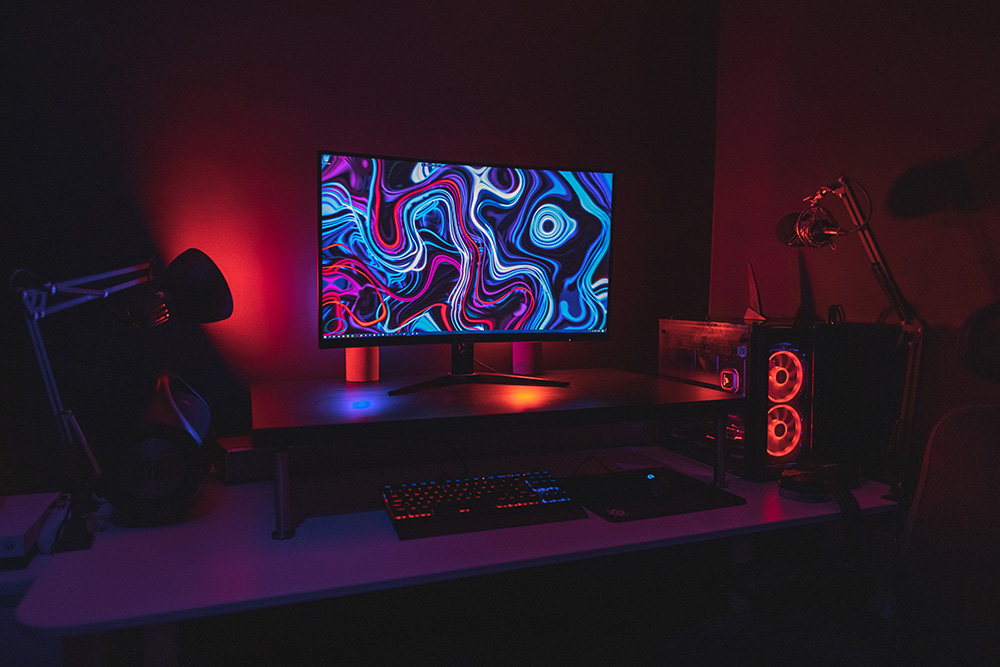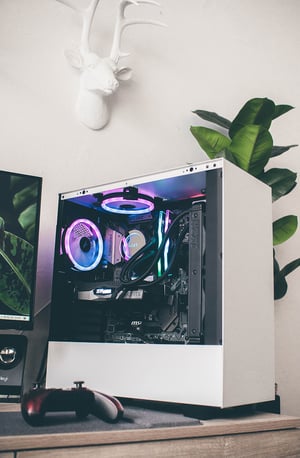Want to get the most out of studying game development at university? We speak with several graduates for their top tips and insights for new students heading into higher education.
There are many things to consider when beginning your journey into higher education. From moving to a new city and becoming independent, to understanding how to budget your finances, so that you don’t starve by week 6.
The following soft skills are not just key to your studies, they are essential for success in a professional environment. As well as learning key skills, a big part of studying a degree in game programming or game art is understanding how to cope in a fast-paced and competitive industry.
We have collated sage advice from several graduates that were kind enough to provide some insights about their university experience and the practical tips and tricks that helped them get organised, and ultimately, end up in employment.
The advice that follows may seem simple and obvious, and that's the beauty of it. All of these techniques are easy to learn, and while it takes dedication to stick to them, they can be implemented seamlessly into your day-to-day.
1. Get organised

Timetable
Your timetable should focus on your day-to-day routines. You may play sport on Monday nights, or go to the gym 5 days a week; these standing appointments belong in your timetable. The timetable is a great mechanism for developing healthy habits and patterns that will aid your studies. The idea is that you should begin to automatically perform the tasks on your timetable once you have been using it for a while. After you have dialled in that routine, you can amend and adjust to develop other useful routines, passively becoming more skilled and disciplined, from just following a piece of paper on your wall.
Bonus Tip: Put this right in your eyeline, where it cannot be avoided. Many students hang their timetables on the inside of their front door so they have to look at it every time they leave the house.
Schedule
A schedule gives you an overview of anything that is not routine for the foreseeable future. This can be over a week or a month. In higher education it makes sense to use a whole semester, but you can use whatever is most relevant to you.
Using a digital calendar for this will allow you to push reminders to your devices, although there is something to be said for the old school method of a paper or whiteboard. These analogue mechanisms can be easily updated or amended, and can be positioned in your eyeline, so you are forced to look at it every day.
The semester schedule can be planned to the last detail with assessment deadlines, hours of work and project milestones plotted out so you do not get surprised by a deadline. You may choose to also use a diary for this. Good diaries have to-do lists, timetables and other sections that help with organisation. Keeping things digital can often mean things are hidden from view and can make you dependent on reminders.
Bonus Tip: If you are not in the habit of checking these digital organisation mechanisms, it is advisable to break out of the computer and get some planning tools into the real world.
To-do list
The to-do list is probably the most powerful planning tool. Every successful professional has a to-do list, and works their way through it every day, updating it at the end of the day to show what has been completed, and what carries over to the following day. This can be on paper or digital, however, be mindful of the same issues that can arise when using digital planning infrastructure.
Bonus Tip: Do not overload your to-do list or you risk becoming overwhelmed. Start with the most essential tasks, and work your way up as you become accustomed to the process.
Note / Sketchbook
This is essential for any degree, digital or otherwise. Being able to externalise and visualise your thoughts immediately, without an electricity supply or internet connection, is a powerful tool that is often underestimated and underused by students in digital-based disciplines. Immediate referral and retrieval means you can draw a picture or take a note in the time it would have taken you to get your laptop out of your bag.
Bonus Tip: Besides the freedom a note / sketchbook gives you, the traditional toolset of pen and paper is something you should continue to master while studying digital art disciplines.
Whiteboard / paper
The whiteboard is an undervalued tool. The ability to easily wipe away details and amend makes it a great substitute for printing lots of paper.
Bonus Tip: It may not be practical to have several whiteboards around your house, however, there is such a thing as whiteboard paper. It can be bought in rolls like wallpaper, stuck to your wall and written on with traditional whiteboard markers.
Watch your timings
Don’t just rely on waiting for deadlines to come up. Putting in a reminder that a deadline is coming can help avoid nasty surprises when they are nested in the next page, or hidden by all the other items scheduled on that day.
Bonus Tip: Even on paper, a pre-warning can really help relieve the anxiety of a delivery date.
Wake up early
Most successful professionals wake up early. Getting a head start on the day will give you the time and space to think about what you have to do for the day. Identifying potential adverse events and inconveniences that could add significant work / time to your day.
Bonus Tip: Try to avoid any devices or screens in the first hour awake. Devices can be convenient, but also a source of anxiety. Give your body and mind time to wake up before you start pumping artificial light into your eyes. Checking your phone first thing sets the tone for the day - your time and attention have been hijacked. There are many studies that demonstrate a negative correlation between the use of devices and melatonin, the hormone that regulates the sleep / wake cycle.
2. Set your budget
Plan your spending, saving and investing.
Spending wisely requires discipline and organisation. Not just the organisation of finances but other aspects of your life. Poor planning can have unintended, yet direct financial consequences. For example, if you are late returning home due to travel chaos, or forgetting about an appointment you had due to a lack of planning, you may not have the time or energy to cook. If you are highly disciplined you may be able to find the energy to cook, however, it is likely you are going to incur an expensive takeaway bill. There are a million other examples of how simple planning can help you avoid unnecessary spending.
Saving is difficult for most in the times we live in, however, it is good to have a goal for saving. Even if you can’t save much, try and save something, with a goal to increase your saving as time progresses. Although you probably won’t be investing in stocks or funds at this point in your career, investing in yourself can be just as, if not more, valuable. Consider putting money aside for additional courses or self-development projects.
Financial help
Financial help can come in the form of loans, grants and overdrafts. Most students will have the ability to receive funding through Student Finance for the duration of their studies, however, this often doesn't completely cover your living costs and so it's recommended that you find part-time work to make up the deficit. If you can find paid part-time work or internships in the industry you want to work in, even better. As well as making you self-sufficient, part-time work is a great way of building useful soft skills and experience.
Depending on the university you study with, emergency loans and bursaries may be open to you, but these are usually offered based on your means/circumstances.
Our article on understanding the finances behind your degree and UCAS' finance resource for UK and international students are both good places to start to better understand the support that is out there.
Bonus Tip: Save as much as you can before heading off to university so that you have a safety net for unforeseen circumstances. Once you've received an offer to study at university, you will be eligible to open a student bank account, which usually comes with an interest free overdraft. While we don't encourage you to spend beyond your means, this can be useful for deposits for securing accommodation as they are often required before your first student loan payment comes in.
3. Find the right computer for your course

This will be course dependent to some extent, but think about what you will be tasked with across the three years of your degree? Will you be a power user? Do you need the latest, most expensive machine? What components should you spend more on? To build a winning game portfolio while you study, you’ll need to have access to the right machine.
At dBs, you’ll learn on high-spec gaming PCs from ASUS and MSI in our game development suites. Check out this article on our equipment and the other ways studying game at dBs can help you unlock your career.
In order to find the right machine for you, you need to understand the basics of how the individual components that make up the ‘computer’ operate. If you are a game artist, your computer will need to be very capable. Game artists use software that puts high demands on the computer. 3D software such as Maya and Blender are CPU and GPU intensive, as are game engines.
How does it work?
CPU
Computation and all logic operations (maths), are performed in the central processing unit. For PC there are two main manufacturers of these chips, Intel and AMD. They have several models and specifications, too many to list, but the rule of thumb is the higher the model number, the higher the spec. Dependent on the generation, an Intel i7 is generally more powerful than an i5; an AMD Ryzen 9 is generally more powerful than a Ryzen 7 - you get the picture.
GPU
The GPU deals with all real-time graphics and video output. Data is processed in parallel rather than sequentially allowing it to process the huge amount of graphical data demands of modern games. These units used to be called video, graphic or display cards, and you may still hear that terminology used. Basic machines have integrated graphics, meaning they are built into the motherboard. These integrated GPUs will run most applications with ease, however, they will fail as soon as the GPU demands are too high. 3D, game engines and hardware such as VR headsets will require a more powerful graphics processing unit.
Hard drive
Long term memory provides a space for data that stays in storage when the power is switched off. The operating system runs from here as will all the programs unless specified. Some machines have more than one hard drive which allows for a degree of separation between programs and stored data such as your files. Additional storage can easily be added via USB drives.
RAM
Random Access Memory acts as short term memory. What you see on your computer screen is running from RAM. Data is accessed from the hard drive and loaded into RAM. The amount of content you can have running at once, will usually come down to the amount of RAM you have. It is not as easy to add RAM as it is long term storage.
Who are the manufacturers
Both PC and Mac machines are effective for game art or programming, however, there are some things to consider before committing.
Apple Mac
Macs are very pretty, but they are expensive. The hardware is difficult to access and there are limited options when it comes to GPUs. Operation is far more intuitive and maintenance is easier. There is no need to worry about drivers and updates. Build quality is high so they last, however, new operating systems and hardware requirements will often make your Mac obsolete before it dies.
PC
PCs can often be high maintenance, however, they deliver excellent value for money if you can put some time into understanding what goes on under the hood. Custom rigs are easy to build and easy access to the 'guts' allows for future upgrades. Limitless hardware and software options and configurations mean a PC is more versatile.
Bonus Tip: On a game art / development / design degree, it is advisable to veer towards PC than Mac. They are more affordable and adaptable to the requirements of your workflows.
4. Create a suitable study environment

Environment
Environment for some, is everything. Without an environment that is conducive to learning, you can struggle to study effectively. There is a lot to the old saying; tidy room, tidy mind.
- Is it tidy?
- Is it quiet?
- Do you have enough room?
- Is it lit properly?
Do what you can to answer “yes” to these questions.
What mechanisms can you put in place to make your environment a productive place to work in?
Bonus Tip: If noise is an issue, you can look at investing in a pair of noise cancelling headphones. It's not a perfect solution, but you will have at least addressed one of the main factors that can affect your productivity. If you share a study space, it is far more challenging to have control over these factors.
Focus
It is easy to forget that study itself is a skill and discipline that is learned and takes practice and self-awareness to master. Recognising distractions and detrimental factors that will impede or hinder your studies is 50% of the battle when it comes to mastering how to study.
Bonus Tip: One of the advantages of practicing self-awareness when you study is that you recognise and understand when you are concentrating, when you are not, why you are not, and how to fix it when you are struggling to focus.
Pomodoro
Pomodoro is a study methodology that suggests you break your workday into 25-minute focus periods followed by five-minute breaks. Each of these focus periods plus a break period is called a Pomodoro, after the tomato-shaped timer first used to test the method. Many experiments show how focus drops exponentially after 20 – 25 minutes. The Pomodoro method ensures focus and productivity stays consistent throughout the day.
5. Establish a healthy study/life balance
Social media
Social media is invaluable for building your professional networks and staying up to date with current professional practice, but it's a real time sink. A necessary evil some might say, so much like gaming, exercising discipline is key. Try to limit your time on recreational social media. You can however, put digital barriers in place to encourage healthy habits. For example, don’t install the app on your phone, so you have to go to a computer to check it, or set your phone up to limit the time it will allow you to access social media apps.
Bonus Tip: LinkedIn is the main professional social media networks, but there are many others, some bespoke and highly relevant to your chosen discipline.
Gaming
It's far too easy to lose valuable study time or sleep due to gaming, and if you do not exercise real self-awareness and discipline, it can become a very real problem. Now obviously, on a games course, you will need to play games, but do try to be aware of the hours you are putting into gaming compared to your studies. If you are putting more hours into gaming than your studies, it is probably worth trying to reduce your gaming time.
Bonus Tip: Many things in life are about balance, and if you are able to effectively prioritise your time on your self-development and professional advancement, you are far more likely to succeed achieving your goals.
Real world
Social media can certainly help with growing your network, but you cannot underestimate the importance of getting out in the real world and meeting people. Most cities will have active game hubs that organise regular meetups and game jams, and these are a great way to start to meet likeminded people within the scene and apply your skills outside of your studies.
It can feel a little antiquated, but the pub remains a great way of getting to know new people and bonding over common interests, even if you don't drink alcohol.
Learn to say no
We all (mostly) want to get along with others, and help them when possible. This is an admirable quality, however, it is important that you are able to say no when required. Many people will happily take up your time with little consideration, so be mindful of this when deciding to offer your time to others.
Identify and grasp opportunity
You will be provided with many opportunities during your studies, from visiting guest speakers, to trips and events. So many students do not take advantage of this, missing unique opportunities that may never be afforded to them again.
Bonus Tip: It is worth remembering, many of the people you meet throughout your studies, including your peers, may one day be your work colleagues.
6. Don't forget the essentials

Hopefully, if you've been able to successfully start utilising a timetable and schedule, you won't find yourself in a mad scramble to get out of the door on time, but it happens. It's easy to assume you've got everything you need, but it trips up students (and tutors!) daily.
- Phone: Is it fully charged? Have you got a cable in your bag as a backup in case the battery dies?
- Keys: Don't get locked out! It can add hours to your day and put you in a terrible mood. If you're prone to misplacing them, getting a key dish or hook for them can prevent you searching your home when you're in a rush. Similarly, an AirTag or similar product can prove useful should they disappear.
- USB: The form does not matter, but carrying some kind of storage is invaluable to your studies. if you are working with lots of large projects, make sure you've got a decent sized hard drive.
- Headphones: Even if you are not working with media, it is useful to have headphones to minimise external noise distractions.
Travel contingencies
Plan for late transport, particularly if it happens regularly. So many students are late for the same lectures, missing the actual lecture and being on the back foot and having to catch up every session. If it keeps happening, plan for earlier transport.
Bonus Tip: Plan your day and get your bag together the night before. This will alleviate so much unnecessary last minute stress. All you have to do is check your bag before you leave in the morning. You will be surprised how much of a difference this will make to your day.
Start fresh
Start as you mean to go on. Get those good habits and routines dialled in from day one! Remember this is the start of the rest of your professional life, so start strong!
FIND OUT MORE
How to get into the gaming industry
Keen to get more tips and insights on studying game and the wider industry?


